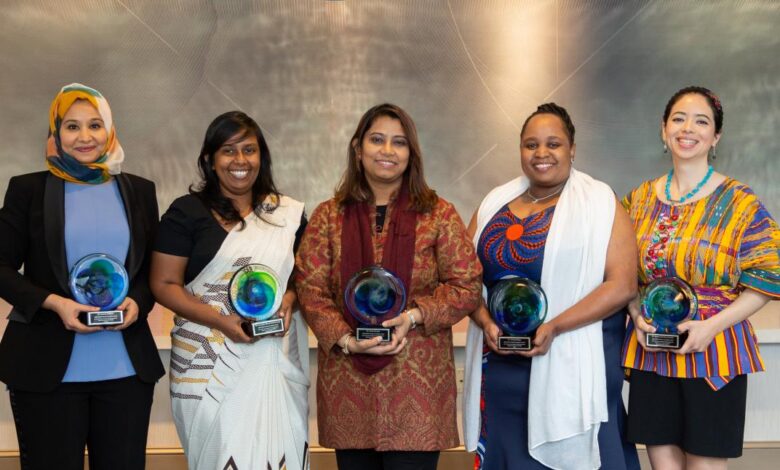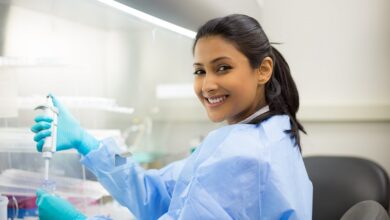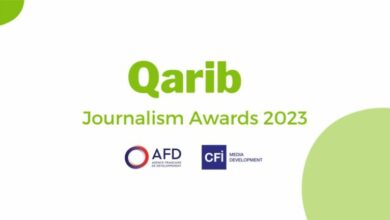
OWSD provides research training and networking opportunities for women scientists throughout the developing world at different stages in their careers. The Organization for Women in Science for the Developing World (OWSD) is an international organization founded in 1987 and based at the offices of The World Academy of Sciences (TWAS), in Trieste, Italy. It is a programme unit of UNESCO.
OWSD is the first international forum to unite eminent women scientists from the developing and developed worlds with the objective of strengthening their role in the development process and promoting their representation in scientific and technological leadership.
OWSD provides research training, career development and networking opportunities for women scientists throughout the developing world at different stages in their careers.
Benefits
- Cash prize of USD 5,000.
- All-expenses-paid trip to attend the Awards Ceremony to be held at the annual meeting of the American Association for the Advancement of Science (AAAS) in March 2023.
- The trip will be confirmed in the coming months depending on the global COVID-19 pandemic situation; it may be that the awards ceremony is celebrated online.
- Awardees will not be required to travel if they judge the situation to be unsafe.
- The 5 awards will be distributed as follows: one for each of the four regions of the developing world (Africa, Arab region, Asia & the Pacific and Latin America & the Caribbean), plus an additional ¨floating” award for an outstanding candidate from any of these regions.
Eligibility
- The applicant must be a woman who has received her PhD in a scientific discipline within the previous ten years and whose current scientific research is related to the area of food security, agricultural productivity and/or sustainable food production.
- Applicants must demonstrate how their research contributes to advancing knowledge in the area of food security, agricultural productivity and/or sustainable food production.
- The application can include, but is not limited to, references to the SDG2 target areas , e.g. universal access to safe and nutritious food; ending all forms of malnutrition; doubling the productivity and incomes of small-scale food producers; sustainable food production and resilient agricultural practices; and maintaining genetic diversity in food production.
- The OWSD-Elsevier Foundation Awards are offered to women in Science, Technology, Engineering and Mathematics (STEM). Applications from women in Social sciences, Humanities, Arts or other are NOT eligible.
Eligible STEM fields:
- Agricultural Sciences
- Astronomy, Space and Earth Sciences
- Biological Systems and Organisms
- Chemical Sciences
- Computing and Information Technology
- Engineering Sciences
- Mathematical Sciences
- Medical and Health Sciences (including Neurosciences)
- Physics
- Structural, Cell and Molecular Biology
Any combination of these fields (i.e. interdisciplinarity) is acceptable.
- In addition, the applicant must have lived and worked for at least 5 of the last 15 years* in one of the 66 scientifically and technologically lagging countries (STLCs) listed here: Africa: Angola, Benin, Burkina Faso, Burundi, Cameroon, Central African Republic, Chad, Comoros, Congo, Côte d’Ivoire, Dem. Rep. Congo, Equatorial Guinea, Eritrea, Ethiopia, Gambia, Ghana, Guinea, Guinea-Bissau, Kenya, Lesotho, Liberia, Madagascar, Malawi, Mali, Mauritania, Mozambique, Niger, Rwanda, Sao Tome and Principe, Senegal, Sierra Leone, Somalia, South Sudan, Swaziland, Tanzania, Togo, Uganda, Zambia, Zimbabwe.
- Arab Region: Djibouti, Palestine (West Bank & Gaza Strip), Sudan, Syrian Arab Republic, Yemen.
- Asia & Pacific: Afghanistan, Bangladesh, Bhutan, Cambodia, Kiribati, Lao People’s Dem. Rep., Mongolia, Myanmar, Nepal, Solomon Islands, Sri Lanka, Tajikistan, Timor-Leste, Tuvalu, Vanuatu.
- Latin America & Caribbean: Bolivia, El Salvador, Guatemala, Haiti, Honduras, Nicaragua, Paraguay.
- Please note: The 5 years of residence in the eligible country do not have to be consecutive and applicants can be citizens of any country, provided that they fulfil the above residence requirement.
Preference will be given to those candidates not currently (or within the last three years) in receipt of The World Academy of Sciences (TWAS) or OWSD awards, fellowships or grants. Please note that OWSD Early Career Fellows and Alumnae are not eligible for these Awards.
Applications
- Applications for the 2023 awards are invited from women scientists who have made significant contributions in the area of food security, agricultural productivity and sustainable food production, whose research is linked to the SDG2 (Zero Hunger), and have lived and worked for at least 5 years.
Applications must be made online, in English, and must include:
- Official documentation proving 5 years’ residency in an eligible STLC .
The following documents can be submitted as proof of residence as long as the name of the applicant (as written in the online form) appears clearly: statement from the local police office or municipality, population registry office, rental agreement, utilities bills, employment contract. This list is not exhaustive and alternative documents can be considered. Please write to owsd@owsd.net if you are not sure about the eligibility of your documents.
- Evidence on how your research contributes to advancing the SDG2 (Zero Hunger).
- Short biography of approximately 350 words describing your journey to become an outstanding scientist (for ease, we recommend that you prepare this beforehand and copy-paste into the text box)
- PhD certificate
- Curriculum vitae
- Full list of publications
- At least 2 reference letters (reference letters must be prepared on official letterhead and should be written and signed by senior scientists familiar with your research).
- The deadline for submission of applications for the 2023 awards is 15 September 2022.
- Application guidelines and a sample application form can be found here.







